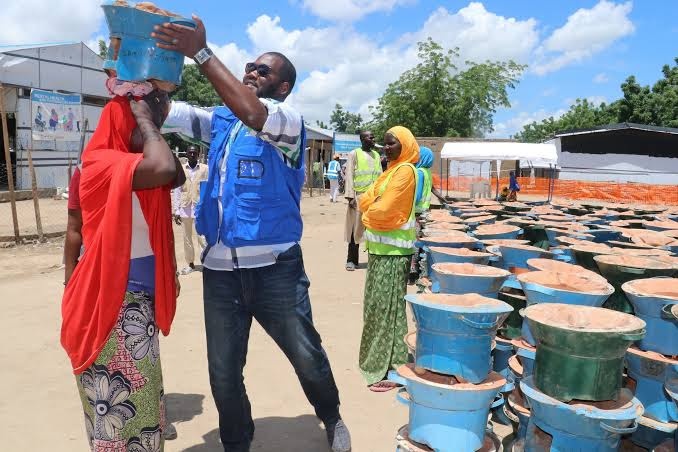#WorldFoodDay: Food Ration Cut Looms In Northeast Nigeria As Hunger Reaches 5 Year High
With over two million people displaced, the World Food Programme has announced they may soon be unable to sustain life-saving operations in Northeast Nigeria.

The United Nations World Food Programme (WFP) has said due to the years of conflict and insecurity in Northeast Nigeria, it will have no choice but to cut food rations in Yobe, Borno, and Adamawa states.
The WFP said the situation has been worsened by the socio-economic fallout from COVID-19, high food prices, and limited food supply.
According to the organisation, the cuts would come just as the number of Internally Displaced Persons (IDPs) surpassed two million in Sept. 2021. This was another grim milestone, accompanied by severe hunger, and reaching a five-year high in the country.
Chris Nikoi, WFP’s Regional Director for West Africa explained cutting rations means choosing who gets to eat and who goes to bed hungry.
Following his recent visit to Nigeria, he saw how funding from their life-saving humanitarian work dried up, just at the time when hunger was at its most severe.
If at least $55 million is not received in a matter of weeks, he said, “WFP will have no choice but to cut food rations and reduce the number of people it serves – where assistance is prioritised for the most vulnerable – as early as November.”
“Our food assistance is a lifeline for millions whose lives have been upended by conflict and have almost nothing to survive on. We must act now to save lives and avoid disruptions to this lifeline,” Nikoi added.
“In Northeast Nigeria,” he said, “the number of internally displaced people has been rising and reached a new all-time high of over two million people and while current food security analyses show that 4.4 million people in Northeast Nigeria do not know where their next meal is coming from.”
He stated that over one million children are malnourished due to the displacement.
“Continued attacks by non-state armed groups, harsh lean season conditions amid an economy dealing with the COVID-19, high food prices and a reduction in household purchasing power has contributed to a bleak outlook for the most vulnerable people in Northeast Nigeria,” Nikoi said.
Despite increasing needs, WFP has announced that they may soon be unable to sustain life-saving operations in the Northeast.
“Without additional resources, the food assistance agency will run out of funds for emergency food distribution and nutrition support by the end of October 2021,” Nikoi raised an alarm.
Edward Kallon, United Nations Humanitarian Coordinator in Nigeria said taking this decision will be painful for humanitarians as it will negatively affect children, women and men uprooted from their homes due to continued violence.
“As we call upon our partners to step up their support in response to the growing needs, I would like to say thank you to those who have stood with us over the years in providing the much-needed humanitarian assistance in the country,” Kallon said.
Support Our Journalism
There are millions of ordinary people affected by conflict in Africa whose stories are missing in the mainstream media. HumAngle is determined to tell those challenging and under-reported stories, hoping that the people impacted by these conflicts will find the safety and security they deserve.
To ensure that we continue to provide public service coverage, we have a small favour to ask you. We want you to be part of our journalistic endeavour by contributing a token to us.
Your donation will further promote a robust, free, and independent media.
Donate HereStay Closer To The Stories That Matter




